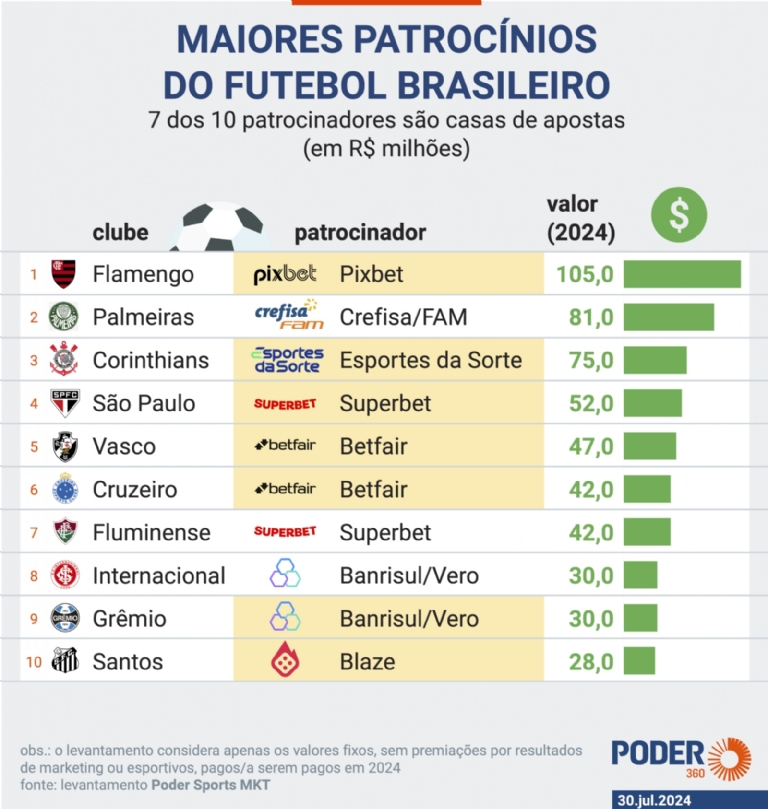

Currently, the fixed-odds betting market is in a transition period. The moment is marked by the wait for the regulation to produce all its legal effects, according to the sole paragraph of art. 9 of law 14.790 of 2023, known as the Fixed-odds Betting Law, with an estimated end date of December 31 of this year.
As of January 1, 2025, betting operators operating in Brazil that operate without the proper authorization from the SPA (Secretariat of Prizes and Bets) of the Ministry of Finance will be subject to the relevant penalties. Punishments may be extended to those who facilitate, encourage, permit or in any way contribute to irregular activity in the country.
In this context, the placement of advertising and marketing campaigns for unauthorized operators constitutes a punishable administrative infraction, requiring special attention from advertisers, such as football clubs, which depend economically on valuable sponsorship contracts. Today, 7 of the 10 largest sponsorships in Brazilian football come from betting houses, benefiting clubs such as Flamengo, São Paulo, Vasco, Cruzeiro, Fluminense, Santos and Botafogo.
In terms of relevance and financial volume, 15 of the 20 clubs in the Brazilian Championship Series A obtain the majority of their sponsorship revenues from betting operators, totaling, together, more than R$450 million (US$ 80m) in annual revenue.

Given the importance of sponsorships for the financial sustainability of clubs, which finance their core activities and ultimately result in the production of value for fans, making Brazilian football a more competitive product in the entertainment industry, the impending regulation requires a strategic reassessment. Clubs will need to adopt specific legal and compliance measures to ensure compliance with the Fixed-Odds Betting Law in order to avoid sanctions that could jeopardize their revenues and operations.
From a regulatory perspective, clubs will first need to verify that the betting operator is authorized by the SPA before entering into or maintaining in force any sponsorship agreement. They will then need to monitor scenarios of mergers, acquisitions or any change in corporate control of the authorized operator that could result in the review of the authorization granted.
They must also monitor possible violations committed by the operator that could lead to the review of the authorization, under the Fixed-Odds Betting Law and the regulatory standards on the subject. This analysis can be particularly challenging for lower division or smaller clubs, which may not have the legal team needed to deal with these new issues.
As a result, sponsorship agreements should include specific contractual provisions to help navigate the post-regulatory environment with adequate security. For example, clauses requiring betting operators to periodically provide proof of SPA authorisation will be essential to ensure that clubs are always in compliance with current legal and regulatory standards, mitigating the risk of infringement when advertising for unauthorised operators.
It is equally important to include clauses that provide for early termination of the agreement in the event of loss of authorisation, protecting clubs from potential legal repercussions arising from changes in the regulatory status of operators. In addition, civil liability and indemnity clauses are essential to stipulate that operators must indemnify clubs for any losses or damages arising from breaches of applicable legislation or regulations.
Another point of attention is the initial term of the agreement and possible contract renewals. These must be aligned with the 5-year period of the SPA authorisation, as well as due diligence, reputation and exclusivity clauses, which must also be carefully drafted to mitigate the risks inherent in this type of business.
For existing contracts, in the absence of an early termination clause due to the betting operator’s failure to obtain SPA authorisation, the club will be vulnerable and may find itself in the undesirable situation of having assumed the contractual obligation to advertise an unauthorised betting operator when such conduct would be subject to administrative sanction.
Therefore, the implementation of these contractual protections is essential to ensure that football clubs are fully compliant with the regulation of the fixed-odds betting market. The adoption of the measures will provide the legal certainty necessary for clubs to maintain their operations in a sustainable manner, even in the face of possible changes in the regulatory status of betting operators.
It is important to highlight that, although this article was directed at football clubs, these precautions are equally relevant for any advertiser involved in the Brazilian betting market.
Udo Seckelmann
Lawyer and head of the Betting and Crypto department at Bichara e Motta Advogados, professor at CBF Academy.
Pedro Heitor de Araújo
Law student at PUC-RJ and has been working in the Betting and Crypto areas at Bichara e Motta Advogados since 2022